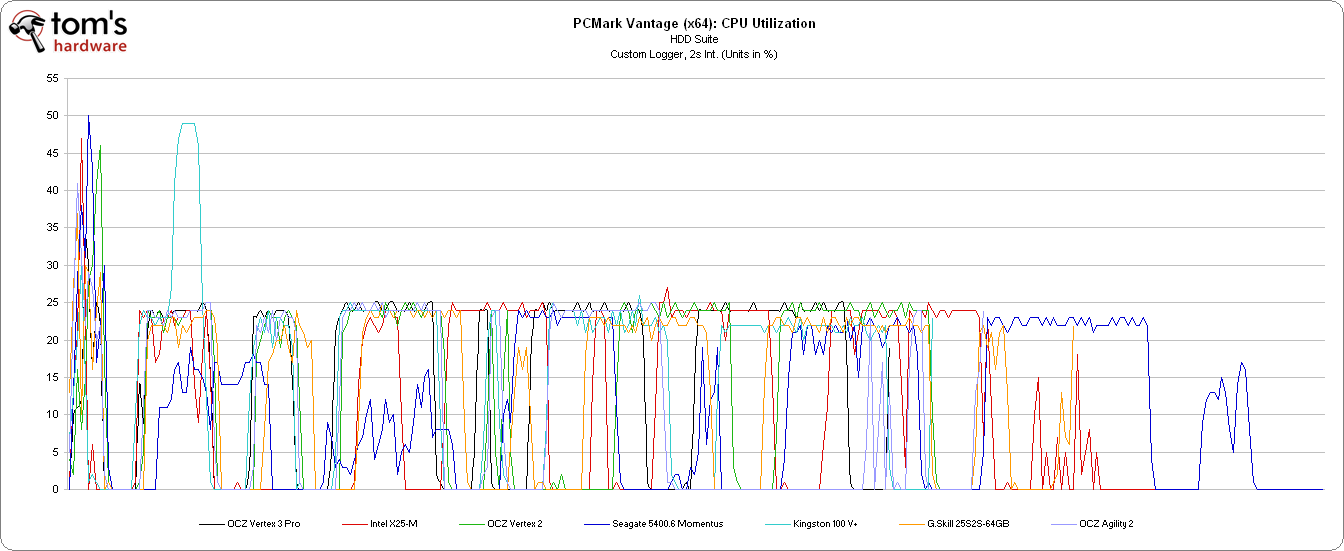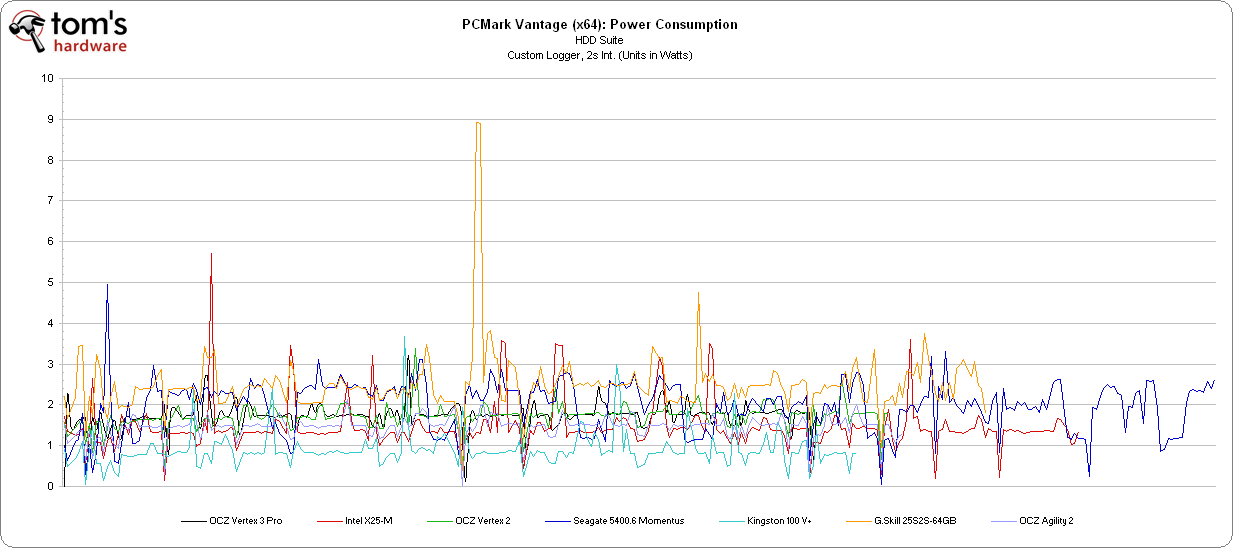OCZ's Vertex 3 Pro: Second-Gen SandForce Perf Preview
Intel's X25-M revolutionized the SSD market. But then SandForce turned it upside down, coming out of nowhere to establish a dominant position. Today we see the company preview its second-generation controller, unleashed over a native 6 Gb/s interface.
Benchmark Results: Power Consumption
After our Intel SSD 310 review, I attempted to find away to specifically measure the power consumed by the drive alone. Our new benchmark configuration consists of a smart battery that allows us to measure DC power consumption on the +5 V and +12 V power rails. As the VelociRaptor also uses the +3.3 V rail, we were unable to include it in the test. This will be remedied in our next test.
In the meantime, our results are unexpected. The Vertex 3 Pro actually manages to use less power than the Vertex 2. SandForce and OCZ both tell us that the maximum power envelope on the SF-2582 is 4 W--double the power specification of SF-1200/SF-1500.
The SF-2000 family has a new feature that allows performance throttling based on a setting in the firmware. If you want to limit performance to 2 W, the latest controller is capable of that. However, we are told that this drive has no such firmware limitation, so it’s possible we aren't really stressing the drive to the point of seeing its higher power consumption.
With that said, our results clearly point out that a disk-based drive will absolutely consume more power. At the system level, it is possible that an SSD could increase power consumption because CPU and memory utilization rises in response to improved I/O activity (they're not sitting there, waiting on a hard drive to send data). But remember that a SSD based configuration will always finish those operations faster. At the end of the day, a SSD will lower power consumption.
| PCMark Vantage (x64) HDD Suite | Average Power Rating (W) | ActualPower Used (mW) | AverageCPU utilization (%) | Completion Time (mm:ss) |
|---|---|---|---|---|
| Kingston SSDNow 100 V+ | 0.6 | 85 | 14.7 | 8:06 |
| OCZ Agility 2 | 1.4 | 186 | 10.9 | 7:54 |
| Intel X25-M | 1.4 | 242 | 10.8 | 10:17 |
| OCZ Vertex 3 Pro | 1.6 | 207 | 15.1 | 7:41 |
| OCZ Vertex 2 | 1.9 | 269 | 13.9 | 8:28 |
| Seagate Momentus 5400.6 | 2.2 | 426 | 10.4 | 11:40 |
| G.Skill SATA II FM-25S2S-64GB | 2.6 | 369 | 13.5 | 8:40 |
Get Tom's Hardware's best news and in-depth reviews, straight to your inbox.
Current page: Benchmark Results: Power Consumption
Prev Page Benchmark Results: PCMark Vantage Storage Test Next Page Final Words-
Bigmac80 This is why i haven't bought a SSD yet. One it's freakin expensive 2 not enough capacity 3 it's freakin expensive! It'll go down next year when the world ends in 2012.Reply -
falchard Price is lower then last generation. A shrink in die size means cheaper manufacturing costs, lower power usage, and better performance. Thats what happens when every hardware company shrinks their chips.Reply
Considering this is going to have the same amount of space, its going to be a cheaper SSD. -
aaron88_7 These are for enterprise use, that's why they are priced so high. They have features average consumers don't need. In other words, you're wasting your money if you are putting these into your home computer.Reply -
dragonsqrrl OCZ Vertex 3 Pro MSRP Pricing:Reply
100GB: $525, $5.35 per GB
200GB: $775, $3.88 per GB
400GB: $1350, $3.38 per GB
Getting cheaper, but still far outside my price range given their relative capacities. Even taking their amazing performance into account, it's still going to be a difficult sell for all but the most passionate enthusiasts, pros with heavy server workloads, or hardcore idiots. You're definitely not going to be getting your moneys worth putting one of these into your gaming rig. Enterprise type applications experience the largest benefits from these types of drives, and it's probably the only application where the performance benefits balance out the higher costs. -
JohnnyLucky The article made it perfectly clear the drive is not a drive that will be offered to consumers, gamers, and pc enthusiasts. How is OCZ going to reduce prices for consumer drives? Reduce features? Cut corners? Replace high quality components with lesser quality components? On answer is OCZ will reduc features. I'd like to know what else OCZ is going to do.Reply -
Please add a TrueCrypt benchmark to your SSD evaluations, for two reasons. First, the difficulty of truly erasing data on a flash drive makes data security more important. Second, there are drives (like Sandforce) that use compression and may behave differently when storing encrypted (high entropy) data.Reply
-
Miharu Presently Plextor M2-M2S offer 370-420MB/s read for what... (64gb)150$-(128gb)250$. Vextor 3 price is out of the loop, it's too expensive. At this price I can buy 2 Plextor and put them in RAID 0.Reply

